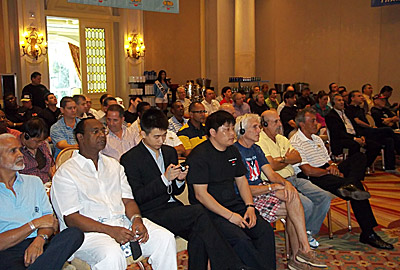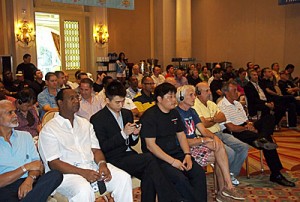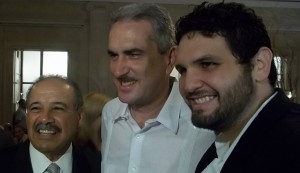
WBO Convention Day 1
Story and photos by David Finger
The 24th Annual WBO Convention kicked off Tuesday morning with exciting developments in the form of a new title, new developments with the regional titles, and major developments in what is proving to be one of the most exciting additions to the WBO in recent years in its female champions.
The event kicked off with roll call, followed by an invocation from second Vice President Jacinth Bryan Labega. After approving the prior minutes from the 2010 Convention in Cartagena, Colombia, the WBO adknowledged several of the notable fighters who came out to support the WBO. Female champions Yesica Bopp from Argentina (the reigning 108 pound champion) and 115 pound champion Carolina Duer (also from Argentina) received warm ovations, as did WBO Asia Pacific Heavyweight champion and #10 ranked WBO contender Chauncy Welliver. From there the president suggested a slight change in the agenda and moved President’s Luis Batista Salas Championship Committee Report to be done first.
A short video highlighting the accomplishments of the WBO’s “Kids Drug Free” program followed, showcasing the WBO’s commitment to continuing service to the community in places as diverse as Mexico and the Philippines.
However, Mr. Salas’ report did start off with a somewhat sobering reminder of the recent economic downturn suffered in Europe and the rest of the world.
“International boxing has become a victim of what the modern world is victim of,” commented Mr. Salas, “an economic monetary crisis.”
After Mr. Salas then thanked those members who came out to Puerto Rico he added some promising news that quickly lightened the mood. The WBO “had more championship fights than all other organizations,” MR. Salas proudly announced.
“Even though boxing is taking up a position of retreat, we have been able to remain firm because we have great champions and great promoters,” added Mr. Salas, “we held thirty nine championship fights so far this year. All the parts of the world have had participation with a lot of fights.”
Mr. Salas then commented on the integrity and openness of the WBO being a major reason for its success.
“In the past, sanctioning organizations were controlled by one promoter, or two or three at most. But this is a highly democratic organization, highly respected. Wherefore we have more than forty active promoters in the WBO. That is more active promoters than all the other organizations together.”
Mr. Salas then was able to add very promising news about one of the more recent decisions adopted by the WBO, the inclusion of female champions. When the WBO decided to sanction female championship fights in the 2008 Convention in Hungary, it was at times contentious and somewhat controversial with some boxing purist. But Mr. Salas was happy to announce the decision proved to be highly beneficial for not only the WBO, but for women’s boxing as well.
“Last year you approved championship bouts with women, and last year we had a very fruitful discussion. But women have been gaining ground and we have to respect the decision. I am of the opinion that women have done a service to this organization and I would like to that all of you for the bringing women into the professional championship world.”
Mr. Salas then offered some pleasantly surprising numbers that impressed many of the WBO attendees.
“Women only started last year, and (already) we had twenty six womens world championship bouts!”
Mr. Salas then acknowledged the boxing community in both Haiti and Argentina for their commitment and development of women’s boxing.
After Mr. Salas’ report, Mr. Adolfo Flores Monge presented the treasurers report. Despite the recent world wide recession that Mr. Salas referred to, Mr. Monge was happy to announce the the WBO’s revenue increased this year, and that over $115,000 was donated to the “Kids Drug Free” program, one of the largest charitable donations in boxing in recent years.
WBO attorney Andrew Horn then commented on the WBO continued commitment to not only it’s non-profit status, but also its commitment to combating poverty and service.
From there Juan Carlos Tapia presented an excellent video of the history of Puerto Rican fighters. The video was divided into three sections: fighters who were in the Hall of Fame, fighters who should be in the Hall of Fame, and fighters who will be in the Hall of Fame. The sheer volume of names on all three list was a testament to the vital and important role played by Puerto Rican fighters in shaping the history of boxing, and fans and attendees watched clips of such legends such as Carlos Ortiz, Wilfredo Gomez, Wilfred Benitez, Jose Torres, Edwin Rosario, Esteban De Jesus, Wilfredo Vasquez, and Felix Trinidad.
From there President Valcarcel moved to the regional vice presidents reports. But he was proud to announce the success of the newest WBO title: the WBO Youth Title. He then offered his congratulations to the success of the Cuban boxers and Joe Hernandez. However, President Valcarcel did offer his opinion that, in rare instances, the WBO had sanctioned fights that they should have reconsidered.
“We don’t approve fights with bums,” President Valcarcel said sternly, “sometimes we have a problem with fighters who become regional champions who are not qualified to be ranked.”
One of the major problems where this emerged was with fighters in Africa. President Valcarcel admitted that it was often hard to keep track of “real” records of some of the African fighters.
“Many African fighters don’t have a record,” commented President Valcarcel.
Vice President, and head of WBO Africa, Andrew Smale admitted that it was a problem in the past.
“Sometimes I have problems with fights in East Africa,” admitted Smale, “the problem is that we get the records from the commissions, which doesn’t have the same record as on Boxrec. The problem is to actually get these records verified you have to go back to journalistic records and video of the fights which is very difficult. It can be done but it is very difficult and time consuming.”
Despite the setback, President Valcarcel commended Vice President Smale for his amazing work in Africa and the strides made in developing boxing on the continent.
Despite the nature of the conversation, many attendees felt it was a sign of the transparency of the WBO that such a sensitive subject was being discussed in such an open manner.
The next report presented was NABO and WBO Intercontinental Executive Director Mark Reels.
The NABO did suffer a slight decline from the previous year, with twenty nine championship fights in 2010, and fifteen so far in 2011 it was looking like the NABO would come up slightly short of its previous totals from 2010. However, several unforeseen circumstances did seem to unduly lower the numbers. Several canceled fights and two vacant title fights resulting in uncrowned champions due to overweight fighters were cited. However, with a scheduled NABO title fight scheduled in Canada later in the year, it was looking as if the year would end strongly.
“As a former professional fighter myself I will not approve a fight with fighters of lesser quality,” added Mr. Reels.
The NABO, despite the slight drop from 2010, did have another profitable year with over $45,000 raised, and with six title fights scheduled before the end of the year, Reels was anticipating gross sales of over $61,000. Although Reels admitted it would be the lowest gross revenue the NABO collected since 2005, he was optimistic that the strong finish to the year, would lead to a strong recovery in 2012.
The WBO Intercontinental report followed, with exciting developments as the number of fights so far has increased from seventeen in 2010 to 27 so far in 2011. Much of the increase was due to Vice President Reels and member Edoardo Ceccoli’s exciting expansion of the WBO Intercontinental in the USA.
“In the previous year there were sixteen European Intercontinental title fights to only one in the United States,” commented Ceccoli, “This year there are 10 Intercontinental fights in the USA.”
After lunch Vice President Leon Panoncillo gave his Asia Pacific Report. Mr. Panoncillo’s success with the WBO Asia Pacific continued in 2011 with another banner year for the regional title.
Although there was a slight drop in revenue, in part due to the nature of the high profile David Tua title fight in 2010, Panoncillo was happy to announce the WBO was doing three times as many title fights as their competitors in the OPBF and PABA. With strong support from the Philippines, Thailand, and China, the WBO is continuing to grow in the region. Panoncillo commented on the success of not only the Asia Pacific championship (which held twenty seven fights in 2011) but also some of the other regional titles such as the Oriental title (which saw twenty one title fights in 2011) and the newest belt: the WBO Asia Pacific Youth championship, which saw ten championship fights in 2011. In all, Panoncillo and the Asia Pacific region saw over 59 championship fights in 2011, with revenue over $56,000. But Panoncillo also added that these fighters are seeing the fruits of their commitment to the WBO and vice versa. Many of the Asian fighters who recently were fighting for regional eblts now see themselves fighting, and winning, world titles.
Following Mr. Panoncillo’s report, Vice President Andrew Smale gave his report on WBO boxing. Once again Mr. Smale showed why he is quickly establishing himself as one of the WBO’s most valuable commodities, with further grown in the continent and what is looking very close to absolute WBO dominance of the boxing scene in Africa. Smale was proud to announce eighteen title fights in 2010. And so far in 2011, he has presided over seventeen with five future dates confirmed. It is rapidly expanding each year, and despite the difficulties promoters in Africa face, the WBO’s commitment to boxing in Africa is clearly paying huge dividends. Smale also commented in the increasing strength of boxing in Ghana, and the impressive nature of the numbers when compared with some of the rival organizations. The ABU (associated with the WBC) had only one fight in 2011, as did the WBC Intercontinental. The IBF Africa Championship has yet to do a fight in 2011. Smale closed by announcing that the WBO collected $21,400 in Africa so far this year, and he is optimistic that at least two African regional champions may get title fights in the coming year.
After Andrew Smale’s report,Vice President Istvan” Koko” Kovacs gave his report on the state of WBO Europe.
Although the WBO still is having problems with the actions of the European Boxing Union, the growth of the WBO Europe still remains impressive. In 2009 there were only two title fights. In 2010 it was up to twelve fights. So far in 2011 there have been eighteen fights, proving that 2011 will be a banner year for WBO Europe. Thus far, the WBO Europe has collected over $61,000 this year.
Next came Zhang Tao’s report on the state of the WBO China Region. With a successful debut in 2010 in a fight that hosted Mike Tyson as an ambassador, the boxing scene in China proved to be one of the most untapped and prosperous regions in the world for the sport. A televised fight featuring Heavyweight contender Chauncy Welliver in China (where he is affectionately nicknamed the Panda) was seen by over seventeen million people, making him one of the most recognizable fighters in the largest country in the world.
Markus Aslani followed with his report on female boxing in the WBO. He proudly announced the the WBO had over twenty six fights since the last convention, with over twenty this year alone. Aslani was also confident that 2012 would also see continued expansion.
John Duggan then gave a very brief report from the Grievance Committee, stating that 2011 was, thus far, “another good… problem free year.”
President Valcarcel did add that the problems with the EBU and the British Board of Boxing and Control may require more drastic action from the WBO in the form of litigation in the courtroom.
British member Dennis Gilmartin commented on the problems he had with the BBB when he was working on the promotional end of the sport.
“It’s a board issue,” commented Gilmartin, “they won’t recognize us . It’s not a promotion issue. I think it’s an issue between WBO and the British Boxing Board of control.”
President Valcarcel showed his growing frustration with the position of the EBU as well, addition that although they were working towards a resolution, litigation may be in the near future if nothing could be done.
“We are still working on that recognition. But sooner or later, I’m telling you, if we have to we will do something in Court. It is very expensive, but if we have to do it we will.”
Much of the dispute is around the alleged EBU position that the name “Euoropean Champion” remains their trademark, a position that Mr. Duggan (an attorney), finds offensive and preposterous.
“They can’t own the name ‘European champion’,” commented Duggan, “they don’t own that name. That name is owned by the people of Europe and the world. That’s why it is so arrogant that they take this position. It’s not their right to force a boxer to choose (between the WBO and EBU). It’s not there right to force a promoter to chose. It’s an offence to the law. It is very detrimental to the sport of boxing.”
WBO attorney Andrew Horn also commented on the legality of the alleged EBU position.
“What they are doing is an obstruction of free trade,” added Horn, “It amounts to anti-trust. They can’t restrict free enterprise. They own their name, the prefix. But not ‘European’. They have no honorable position. The WBO has been honorable not to take this to litigation, not to air this out in the courts, if we don’t get this worked out soon we have no choice but to work this out in the courts. I have recommended to the WBO that we file suit a long time ago. We never lost a case. I think most people are afraid to sue us. I think Paco has given it a tremendous run and done what he can to keep it out of court, but I think it has run its course”.
http://www.fightnews.com/Boxing/wbo-convention-day-one-99653

